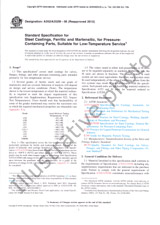We need your consent to use the individual data so that you can see information about your interests, among other things. Click "OK" to give your consent.
ASTM F38-18
Standard Test Methods for Creep Relaxation of a Gasket Material
Translate name
STANDARD published on 1.8.2018
The information about the standard:
Designation standards: ASTM F38-18
Note: WITHDRAWN
Publication date standards: 1.8.2018
SKU: NS-904487
The number of pages: 9
Approximate weight : 27 g (0.06 lbs)
Country: American technical standard
Category: Technical standards ASTM
The category - similar standards:
Filters, seals and contamination of fluidsNon-metalliferous minerals
Annotation of standard text ASTM F38-18 :
Keywords:
creep relaxation, deflection, gasket material, platens, relaxometer, strain, stress, temperature, torque bolt, torque loss,, ICS Number Code 23.100.60 (Filters, seals and contamination of fluids),73.080 (Non-metalliferous minerals)
Additional information
| Significance and Use | ||||||||||||
|
4.1 These test methods are designed to compare related materials under controlled conditions and their ability to maintain a given compressive stress as a function of time. A portion of the torque loss on the bolted flange is a result of creep relaxation. Torque loss can also be caused by elongation of the bolts, distortion of the flanges, and vibration; therefore, the results obtained should be correlated with field results. These test methods may be used as a routine test when agreed upon between the consumer and the producer. Note 1: Test Method B was developed using asbestos gasket
materials and at issuance substantiating data were not available
for other gasket materials.
|
||||||||||||
| 1. Scope | ||||||||||||
|
1.1 These test methods provide a means of measuring the amount of creep relaxation of a gasket material at a predetermined time after a compressive stress has been applied. 1.1.1 Test Method A—Creep relaxation measured by means of a calibrated strain gauge on a bolt. 1.1.2 Test Method B—Creep relaxation measured by means of a calibrated bolt with dial indicator. 1.2 The values stated in SI units are to be regarded as standard. The values given in parentheses are for information only. 1.3 This standard does not purport to address all of the safety concerns, if any, associated with its use. It is the responsibility of the user of this standard to establish appropriate safety, health, and environmental practices and determine the applicability of regulatory limitations prior to use. 1.4 This international standard was developed in accordance with internationally recognized principles on standardization established in the Decision on Principles for the Development of International Standards, Guides and Recommendations issued by the World Trade Organization Technical Barriers to Trade (TBT) Committee. |
||||||||||||
| 2. Referenced Documents | ||||||||||||
|
We recommend:
Technical standards updating
Do you want to make sure you use only the valid technical standards?
We can offer you a solution which will provide you a monthly overview concerning the updating of standards which you use.
Would you like to know more? Look at this page.




 Cookies
Cookies
